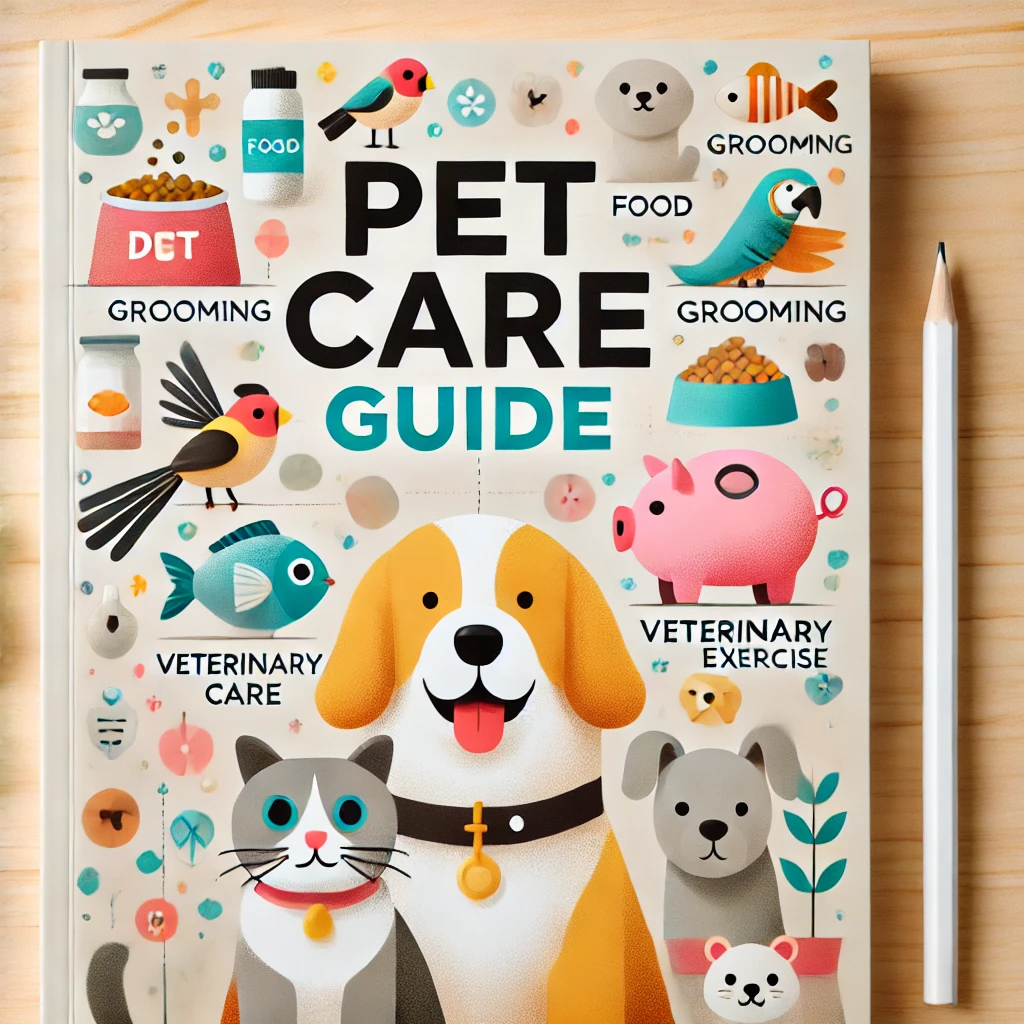Caring for a pet is a rewarding experience that comes with great responsibility. Whether you own a dog, cat, bird, or any other pet, ensuring their well-being requires dedication and knowledge. This guide covers essential pet care tips to keep your beloved companion healthy and happy.

1. Nutrition and Diet
Proper nutrition is vital for your pet’s health. Different pets have different dietary needs, so it’s essential to provide the right balance of nutrients.
- Dogs and Cats: Feed high-quality pet food suited to their age, breed, and health conditions. Avoid feeding them human food that may be toxic, such as chocolate, onions, and grapes.
- Birds: Offer a mix of seeds, fresh fruits, and vegetables to maintain a balanced diet.
- Small Mammals: Provide appropriate pellets, hay, and fresh vegetables.
2. Regular Exercise
Physical activity keeps pets fit and prevents obesity-related health issues.
- Dogs: Take them for daily walks, play fetch, or let them run in a secure area.
- Cats: Engage them with toys, climbing trees, and interactive play.
- Small Pets: Provide exercise wheels, tunnels, and safe play areas.
3. Grooming and Hygiene
Keeping your pet clean is crucial for their comfort and health.
- Dogs: Brush their fur regularly, bathe as needed, and trim nails.
- Cats: Most cats groom themselves, but brushing helps with shedding.
- Birds: Clean cages often and provide fresh water for bathing.
4. Veterinary Care
Regular check-ups and vaccinations keep pets healthy.
- Schedule routine vet visits.
- Keep up with vaccinations and parasite control.
- Watch for signs of illness, such as loss of appetite or lethargy.
5. Mental Stimulation and Training
Keeping pets mentally engaged prevents boredom and destructive behavior.
- Dogs: Teach commands and provide puzzle toys.
- Cats: Use scratching posts, interactive feeders, and new environments.
- Birds: Teach tricks and provide stimulating toys.
6. Safe and Comfortable Living Environment
Create a safe space where your pet feels secure.
- Ensure a clean, well-ventilated habitat.
- Provide a comfortable bed and shelter from extreme temperatures.
- Remove hazardous objects they could chew on or ingest.
Conclusion
Providing proper care, love, and attention ensures your pet lives a long, happy life. Being a responsible pet owner means understanding their needs and giving them the best possible environment.
Pet Care Guide: Essential Tips for a Happy and Healthy Pet
Introduction
Owning a pet is a rewarding experience, but it comes with great responsibility. Proper pet care ensures your furry, feathered, or scaly friend remains healthy, happy, and safe. This comprehensive guide covers essential aspects of pet care, including nutrition, grooming, exercise, healthcare, and emotional well-being.
1. Choosing the Right Pet
Before bringing a pet home, consider:
- Lifestyle Compatibility: Ensure the pet matches your daily routine and space.
- Allergies and Sensitivities: Check for potential allergic reactions.
- Financial Commitment: Consider food, healthcare, and grooming expenses.
- Pet Lifespan: Some pets, like turtles and parrots, can live for decades.
2. Proper Nutrition and Diet
A balanced diet is crucial for a pet’s health. General dietary guidelines include:
- Dogs: Require high-quality protein, healthy fats, and essential vitamins.
- Cats: Obligate carnivores needing animal-based proteins.
- Birds: Need a mix of seeds, fruits, and vegetables.
- Reptiles and Fish: Require specialized diets based on species.
- Avoid Human Foods: Many foods, like chocolate, onions, and grapes, are toxic to pets.
3. Regular Veterinary Care
Routine vet visits prevent illnesses and detect issues early. Essential veterinary care includes:
- Vaccinations: Protect against diseases like rabies and distemper.
- Parasite Control: Regular deworming and flea prevention.
- Dental Health: Brushing teeth and providing dental treats.
- Annual Checkups: Help monitor overall health.
4. Grooming and Hygiene
Proper grooming keeps pets clean and prevents health issues.
- Dogs: Regular brushing, nail trimming, and bathing.
- Cats: Self-grooming but benefit from brushing to reduce hairballs.
- Birds: Nail trimming and beak maintenance.
- Fish and Reptiles: Clean tanks and enclosures regularly.
5. Exercise and Mental Stimulation
Exercise and play keep pets physically and mentally fit.
- Dogs: Daily walks and interactive playtime.
- Cats: Climbing trees, laser pointers, and scratching posts.
- Birds: Flying time outside the cage (if safe) and toys.
- Small Pets: Wheels, tunnels, and chew toys.
6. Training and Behavior Management
Training ensures pets are well-behaved and socialized.
- Basic Commands: Teach sit, stay, and recall for dogs.
- Litter Training: Essential for cats and some small pets.
- Socialization: Expose pets to different environments and people.
- Positive Reinforcement: Reward good behavior with treats and praise.
7. Creating a Safe Environment
Pet-proofing your home prevents accidents.
- Secure Toxic Items: Keep household chemicals, medications, and toxic plants out of reach.
- Provide Shelter: Ensure pets have a comfortable, designated space.
- Avoid Small Objects: Prevent choking hazards.
8. Emotional Well-Being
Pets need love, attention, and companionship.
- Quality Time: Engage in bonding activities.
- Companion Animals: Some pets thrive better with a companion.
- Separation Anxiety: Gradually train pets to be alone for short periods.
9. Special Care for Senior Pets
Aging pets require extra attention.
- Diet Adjustments: Softer food and supplements.
- Regular Vet Visits: Monitor age-related conditions.
- Comfortable Living Spaces: Provide orthopedic bedding.
10. Conclusion
Providing proper pet care ensures your pet lives a long, healthy, and happy life. By focusing on nutrition, exercise, healthcare, grooming, and emotional well-being, pet owners can create a loving and fulfilling environment for their animal companions.